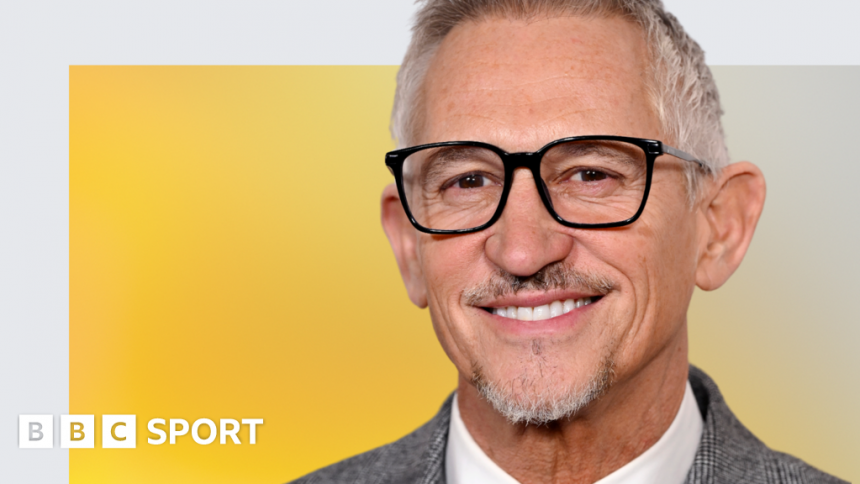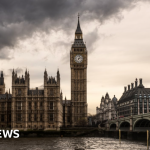‘England will lift a major trophy soon – but I don’t want to wait any more’

-
Published
My lifetime ambition as a player was always to win a major tournament with England. We got very close, but it did not quite happen.
Now it is the same in broadcasting. I have always wanted to utter those words and say an England’s men’s team has won a World Cup or European Championship – and I am hoping Sunday is the day it finally happens.
It is going to be tough, of course. They are playing a very good Spain team with a couple of real superstars and one emerging phenomenon, but I still feel like they’ve got a good chance.
England went very close at the last Euros – losing a final on penalties is as close as you can get without winning – and that experience will help them now. Since then, I have been saying that this team will do it and win something, and I still believe that.
If it is not on Sunday night then it might be in two years, or four, or six… but it will happen because this England side is only going to get better and, if you keep banging on the door, eventually it will open.
I don’t want to wait, though. I just hope it happens on Sunday.
Similarities with Spain in 2008
Torres scores winning goal in Euro 2008 final
It is strange that we have ended up playing Spain in the final because I was talking to Cesc Fabregas earlier at these Euros and he said he saw similarities with this England team and the Spain side of 2008, when they had never won a modern-day tournament.
Like us, their men’s team had won one before, the 1964 European Championship, but again like us and the 1966 World Cup, that was on home soil.
On top of that, Cesc said Spain kind of fudged their way through the early part of Euro 2008 and then kept improving. They had so much talent, things just had to come together. When it did, a World Cup followed two years later, and then another European Championship in 2012.
Gareth Southgate’s side made a very slow start here, too, but like Spain in 2008 they have that talent now – they just have not won anything yet. It would be incredible if they can emulate them by lifting their first trophy here in Germany.
This is the first time England’s men have been in a final on foreign soil, and no England team has ever won a tournament abroad, so they have got footballing immortality at their fingertips.
If they can win Sunday’s final, they will be heroes forever. It is going to be very tight and it could go long – into extra time and beyond – but despite being ready for that I am still quietly confident, even if I don’t want to have too much hope, because we know what that does.
-
-
Published11 hours ago
-
-
-
Published1 day ago
-
We have to say what we think
Euro 2024: Everything will be crossed for England – Lineker
Let’s be honest about it, England are in the final despite not playing very well when the tournament started.
It feels like a lot has been made of the BBC’s analysis of the team, and particularly Harry Kane, when that was happening, but all we did was say what we thought.
We were critical of the first few performances, but everyone was. And even the England players and manager have said since then that there was something wrong in the group games, but they are over it now and they have been improving.
On the BBC, we were basically just saying that too. There were never any personal attacks at all, on Harry or anyone else, because that is not our style – but we do have to be honest about what we see.
I think Harry would be the first to agree that he was not at his best but I feel like we have been fair on him and the team.
The only time I have talked about him myself was from a tactical and technical point of view, speaking as a former striker, about how he does not really run in behind so you have got to get other players to do that.
If those players are not doing it either, England have got a really good alternative in Ollie Watkins, who plays an entirely different game to Harry even though they are both number nines.
Evaluating what Kane does and does not do
How Kane helped England without touching the ball
Harry is the type of player who likes to drift into midfield, drop deep and get on the ball – he’s a brilliant passer of the ball – but he has still got three goals in this tournament.
I don’t think I’ve been critical of him at all, actually. I’ve only ever talked about his strengths and, not necessarily weaknesses, but the things he does and doesn’t do in his game.
He might not have been at his absolute best but he is still the best finisher that I think England have ever had, because he just does not miss, and he is a constant threat from pretty much anywhere.
All we were trying to do as a panel on TV was evaluate all of that, but sometimes newspaper journalists use pundits to ask their questions for them, because they have not really got the courage to say it themselves.
Instead, they will go “Gary Lineker says you weren’t very good”, which is not exactly true and I always think “Well, say it yourself, if that is how you feel”.
We are used to that though, and I guess it is a compliment really, but then when England have started playing well here we then get told “Oh you are being too favourable, you have gone over the top”.
You can’t win, basically, but I think the public, when you see their response, agree that England did not play well in their first games, and they are playing well now.
So, I think most people get where we are coming from. It is our job to be critical, to be analytical and to say exactly what we think, and I think we’ve done that, and done it in a very fair way.
-
-
Published23 hours ago
-
-
-
Published1 day ago
-
-
-
Published23 hours ago
-
The evolution of the number nine
Highlights: Spain 2-1 France
It is not just Kane who has not been running behind defences, by the way. The evolution of the number nine role is one of the trends that have emerged at these Euros, and most of them did it a lot less.
I think what is happening is that we are not getting many great number nines in the game now, and a lot of the existing ones prefer to drop deep like Harry or Spain’s Alvaro Morata, for example, who is getting a lot of stick for his performances too.
Leading the line and trying to play high up the pitch has almost become a slightly sacrificial role in a way, and what is emerging is that forward players now don’t want to be doing that as a nine. Instead, they want to be the ones on either side – not traditional wingers because they are inverted – who are called forwards now.
So, I think most players who are coming through, the really top talents like Lamine Yamal, Nico Williams or Bukayo Saka, want to play wide because when they get the ball they are often facing towards goal, whereas the nine’s job now is much harder.
You are playing with your back to goal, with people thumping you around, you don’t get much of the ball, but you have to make runs all the time and still might not get the pass.
Someone like Erling Haaland, who is not at this tournament, would be doing all that and stretching defences like Watkins is, but I don’t know if they are a dying breed or if the role is changing because of tactical shifts, so that you are more of a figurehead – just allowing people to run in behind you rather than making that movement yourself.
Highlights: Watkins sends England to Euro 2024 final
Just like in my day, strikers still get accused of getting all the glory, because they score lots of the goals – that’s partly true, because Harry has still done that for England, but it is the rest of the job that is demanding, so I can understand why kids want to play in those wide roles rather than my old position.
More than anyone in those roles, number nines are reliant on the team playing well. If you are not getting out of your half, how can you score goals?
So I can see why Harry did not get on the ball in the early games, when I also don’t think he was quite as sharp as he has been in recent years.
For whatever reason, though, he has looked better and better as the tournament has gone on and of course he has to start on Sunday because he is England’s captain, their best goalscorer and one of the best finishers in world football.
If it is not quite working for him against Spain, though, Southgate now knows he can trust Watkins, and he can make that switch.
That’s another thing that has changed in football – you can take your captain and your talisman off after 70 minutes without it being an issue, because it is a squad game now.
That is one of the advantages for England because of the depth of talent they have and, as long as someone gets the winner on Sunday, it doesn’t matter who it is.
Gary Lineker was speaking to BBC Sport’s Chris Bevan in Berlin.






